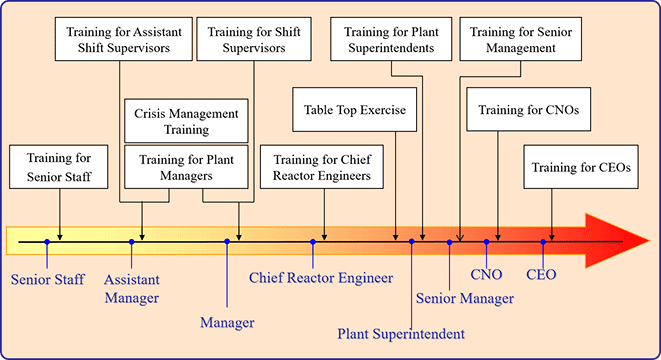


In light of the lessons learned from the Fukushima Daiichi accident, we are developing a leadership training program focused on cultivating a mindset that recognizes the unique risks associated with nuclear energy. This program is designed for all levels, from management to administrators and practitioners, and aims to implement systematic training to strengthen leadership skills.

| Training | Purpose | Summary | Target |
|---|---|---|---|
| Training for CEOs | To share values related to nuclear safety. | Overall discussions with people in the same boat called nuclear power, recalling the lessons learnt from the accident as a CEO, and sharing values related to nuclear safety so that an accident like the one at Fukushima Daiichi accident does not occur again. | CEOs |
| Training for CNOs | To promote a safety culture in the organization and share awareness of the top-level managers of the Nuclear Power Division that protects nuclear safety. | Discussion about the major issues of the nuclear power industry with regard to safety culture, leadership, and responsibilities towards the society, and sharing the awareness of the top-level managers of the Nuclear Power Division. | CNOs |
| Training for Senior Management | To understand role and responsibility demanded to top-level manager of Nuclear Power Division, and share the values against nuclear safety as well as foster the awareness of “we are sailing in the same boat”, while enhancing and boarding quality necessary for them. | Through lectures by experienced directors of the Nuclear Division and discussions with peers in similar positions from other companies, participants will broaden their understanding of the qualities required for top management in the nuclear sector and renew their commitment to becoming future CNO. | Senior Managers (Person of next positon following CNO) |
| Training for Plant Superintendents | To acquire the courage to confront the crisis and to be a leader in the crisis, with respect to nuclear risks, along with re-discovering the preparedness and the requirements demanded from the head of the site. | By attending lectures from Fukushima Daiichi accident responders, engaging in discussions about the requirements for a Plant Superintendent, listening to crisis management professionals from other industries, and exchanging views on the challenges of plant operations, participants will reaffirm their mindset and commitment as the highest responsible individuals on-site. | Plant Superintendents *If plant superintendents cannot attend, proxies may participate instead. |
| Table Top Exercise | By simulating various challenging scenarios that cannot be experienced in real life, participants will enhance their non-technical skills in emergency response, including mindset (commitment and decision-making) and supporting skills such as situational awareness and decision-making. | In this exercise, scenarios involving challenging situations, different from regular disaster drills, will be presented. The emergency response center will receive a vast amount of constantly changing inputs from both inside and outside the plant. Through this exercise, the emergency response center leaders and their supporters will experience the difficulties of recognizing the situation, making decisions, and mobilizing the organization under the constraints of limited resources and time, gaining insights into various challenges. | Leaders, representatives, and team leaders of Emergency Operation Room |
| Training for Chief Reactor Engineers | Fostering a mindset as a leader in nuclear safety, taking action, and continuously working towards the improvement of nuclear safety. | Through presentations and discussions, participants will recognize the roles they must fulfill as Chief Reactor Engineers, fostering a mindset as leaders in nuclear safety. | Chief Reactor Engineers or a representatives |
| Crisis Management Training | To enhance the capability of leadership, strategic instructions, and communication required for problem solving in a critical situation. | The capabilities of strategic instructions and communication required of the team leader of the Emergency Operation Room are enhanced through communication under harsh conditions, situational awareness drills, general supervision drills, actual working drills to accomplish the mission, and discussions after drills. | Leaders of Emergency Operation Room *In principle, department managers and deputy managers who will be serving as Emergency Operation Room team leaders |
| Training for Shift Supervisors | Developing leadership skills under high-stress conditions | Through lectures, group discussions, and role-playing, participants will acquire non-technical skills such as emergency leadership skills required for the position of Shift Supervisors. | Shift Supervisors *In principle, shift supervisors and shift supervisor candidates may attend |
| Training for Assistant Shift Supervisors | To enhance team-building and followership. | Through lectures, group discussions, and role-playing, participants will acquire non-technical skills such as teamwork skills required for the position of Assistant Shift Supervisor. | Assistant Shift Supervisors *In principle, assistant shift supervisors and assistant shift supervisor candidates may attend |
| Training for Plant Managers | To enhance communication and leadership skills, required of Plant Managers | Through lectures, presentations, and practical exercises, participants will acquire comprehensive communication skills that promote respect and mutual understanding. Additionally, they will develop a personal development plan based on their strengths and weaknesses in leadership qualities, allowing them to establish their unique leadership style. | Plant manager and plant assistant manager excluding Shift Department etc. |
| Training for Senior Staff | To enhance leadership, required of the senior staff. | Through lectures and discussions with individuals who experienced the Fukushima Daiichi accident, we will reaffirm our mindset and aspirations as senior staff working at the plant. Following this, we will implement a leadership development program. This program will focus on self-leadership training. Additionally, we will deepen our understanding of the increasingly important concept of self-regulation. | Senior Staff level positions at plants (Management Candidates) |